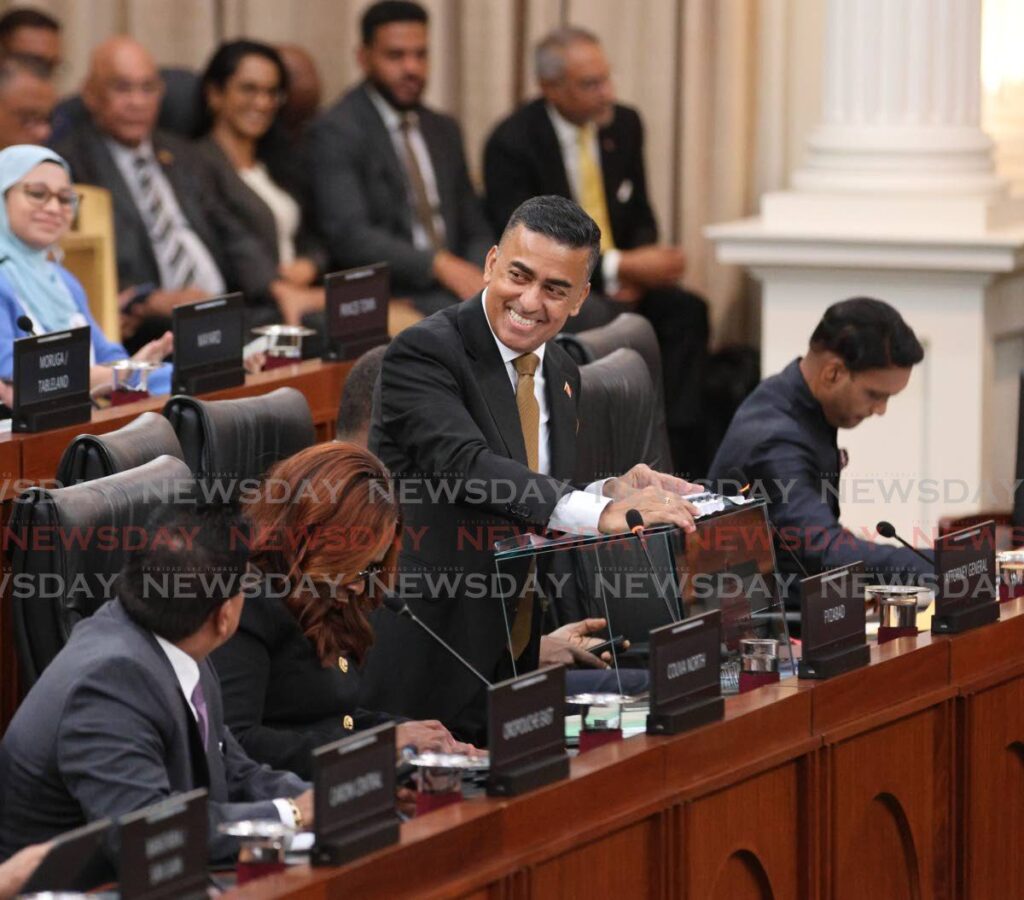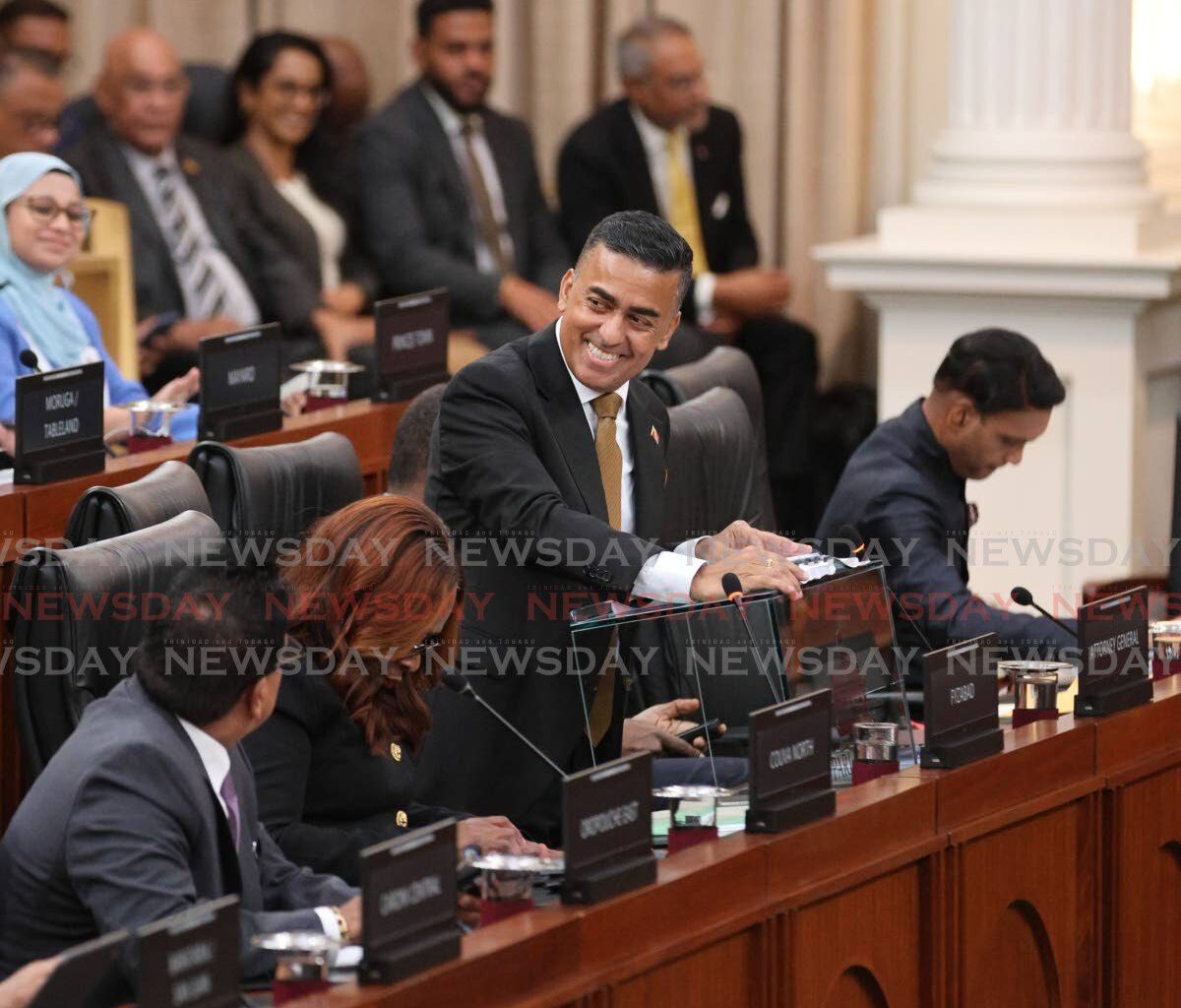Yesterday
 Davendranath Tancoo –
Davendranath Tancoo –
TWO top audit firms – Ernst and Young (E&Y) and PriceWaterhouseCoopers (PWC) – welcomed the fact of Finance Minister Davendranath Tancoo addressing the question of the sustainability of the National Insurance Scheme (NIS) in light of TT’s ageing population.
E&Y and PWC each published their post-budget analyses of Tancoo’s October 13 presentation to the House of Representatives.
Tancoo had announced a three per cent rise in each employee’s contribution to the NIS starting next year and then another three per cent the year after. He will also incrementally raise the retirement age from 60 years at present to 65 years by the year 2036.
From 2028 the retirement age becomes 61 and for every two year period afterwards it will rise by one more year, until reaching 65 in 2036, Tancoo said.
On September 24, Newsday published a story titled, Actuarial report: NIS to collapse within eight years.
The story said, “The fund held by the National Insurance Board (NIB) will be completely done within eight years, by the fiscal year 2033-2034, unless significant interventions are made, warned the 11th Actuarial Review of the National Insurance System (NIS) as of June 30, 2020.” The actuarial report said at present the NIS was “unsustainable.”
The 2020 report predicted that by the same year, fiscal 2020-2021, the fund’s expenditure would exceed contributions and exceed investment income, with assets starting to decrease until fully exhausted by fiscal 2033-2034. The report lamented a drop in workers contributing to the NIS from 542,500 in 2015-2016 to 475,000 in 2019-2020.
Alongside this annual drop of 3.2 per cent in NIB contributors was a 1.0 per cent annual rise in pensioners/claimants, the report said.
Tancoo told MPs the former government had sat idly by for a decade amid warning bells, kicking the can down the road. Saying 200,000 vulnerable citizens rely on the NIS, he declared, “We will not allow the fund to collapse. This government will act decisively where the PNM refused to act.”
The E&Y analysis said it has been apparent for several years that the NIS system was at risk of not being able to satisfy its obligations within the next decade.
“Decisive action was necessary but came with significant political risk.
“It is therefore both commendable and courageous for the newly installed government to take the bold step of increasing the contribution rate and extending the age of retirement over time.”
E&Y said the NIS provides relief to workers, retirees, their families and dependants via pensions and benefits such as survivors, sickness, maternity and funeral grants.
“These reforms are designed to safeguard the NIS and protect the income security of more than 200,000 citizens who rely on it for social support.”
It noted Tancoo saying the NIS annual benefit expenditure now exceeded $6 billion, up by 65 per cent in 20 years.
“Since 2020, benefit payments have consistently outpaced contribution inflows, requiring the National Insurance Board to liquidate investment assets to meet obligations.
“The 11th Actuarial Review projects that, without reform, the fund could be depleted by 2033.”
E&Y noted Tancoo’s proposal for a phased increase in the combined contribution rate from a current 13.2 percent up to 16.2 per cent next January, then rising to 19.2 per cent in 2027.
It added, “Individuals retiring before 1 January 2028, will continue to qualify for a full pension at age 60 and existing pensioners will not be affected.
“The minimum monthly pension of $3,000 remains unchanged.”
PWC in its budget analysis said Tancoo’s move was “proactive and measured.”
“There have been extensive national discussions around the recent actuarial findings, which noted significant concerns around sustainability of the national insurance fund and its ability to meet its obligations. It is accepted that contributions to the fund are below the payouts required to retirees.
“It therefore comes as no surprise that a series of efforts are being mobilised by the current administration to ensure the viability of the fund.”
It said current retirees and workers turning 60 years before 1 January 2028 will not be impacted.
“The Government’s approach to NIS reform is both proactive and measured, balancing immediate fiscal needs with long-term sustainability.
“The phased increases in contributions and retirement age are designed to stabilise the scheme and protect future beneficiaries, while minimising disruption for current and near-term retirees.”
PWC: Allow self-employed to contribute
PWC offered a suggestion to Tancoo, echoing advice in past NIB actuarial reports. “In addition to the measures taken, which are necessary, we would encourage the Honourable Minister to widen the national insurance net to permit self-employed individuals to contribute under the NIS fund.”
SWWTU head Michael Annisette welcomed the changes, while urging individual workers be able to opt for early retirement. He urged the NIB include self-employed individuals.
Annisette noted TT’s ageing population has led to benefits paid by the NIB outstripping its revenues. Saying actuarial reviews had warned of this, he said the question was when to address it.
“Do we wait years again after and then find ourselves in a tailspin, where we can’t maintain the benefits for the retirees?”
Of a hike in NIB deductions, he said, “So, conceptually I have no issue, because it is cementing the viability of the plan.
“To put this off any longer, I think will be acting not in the best interest of the plan and by extension the workers who will be affected.”
Diego Martin North East MP Colm Imbert in a tweet on X made an estimate of the impact of the two year rise in NIS rates, claiming, “The average employee’s NIS payment will now increase from $345 per month to $500 per month, thus wiping out any benefits in the budget.”
Prime Minister Kamla Persad-Bissessar told reporters after the budget reading the lowest level of earner (class I) who earns $1,407 per month will pay an extra $11.70 per month or $2.70 per week.
A top employee (class VI) earning $13,000 per month, will pay an extra $136 monthly, while his employer’s contribution rises by $272, Persad-Bissessar said, presumably referring to the 2026 hike.
On February 15, 2022, Newsday reported Persad-Bissessar telling a UNC virtual report that any change in the retirement age first needed “serious consultations” and any increase should be by choice. She said, “Those who wish to go home at 60, fine. Those who wish to go at 65, fine.
“But you cannot tell a man who has worked his whole life, put his savings, paid his NIS every week or every month, ‘Sorry sir, you cannot get it. You have to wait until 65.’”

